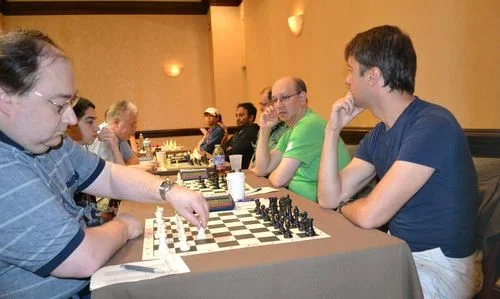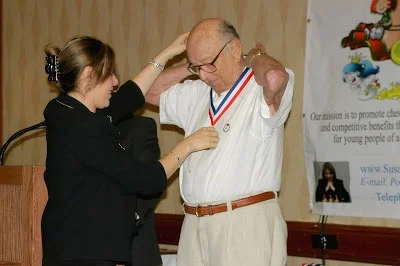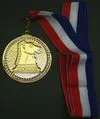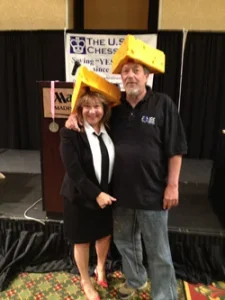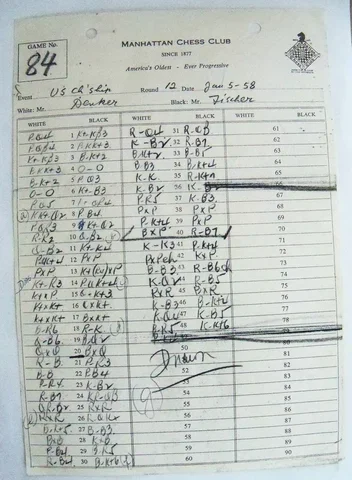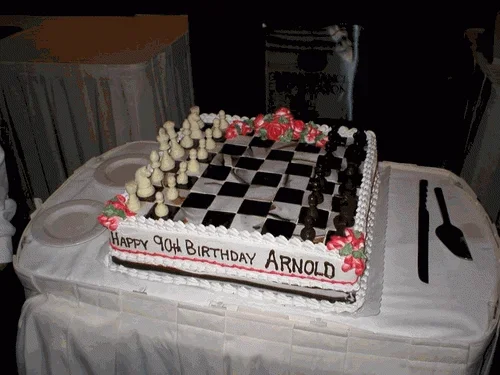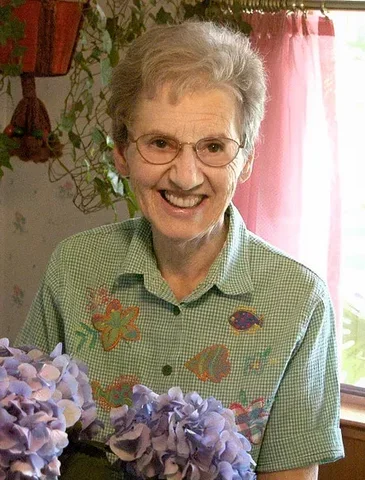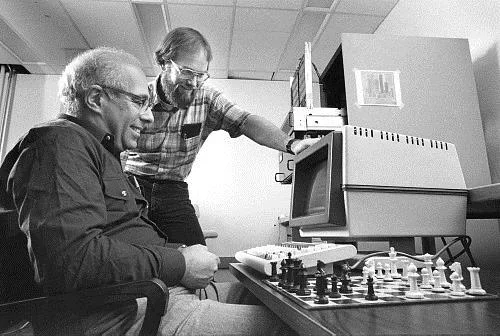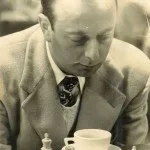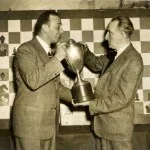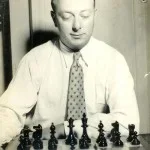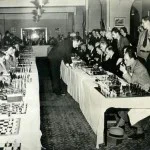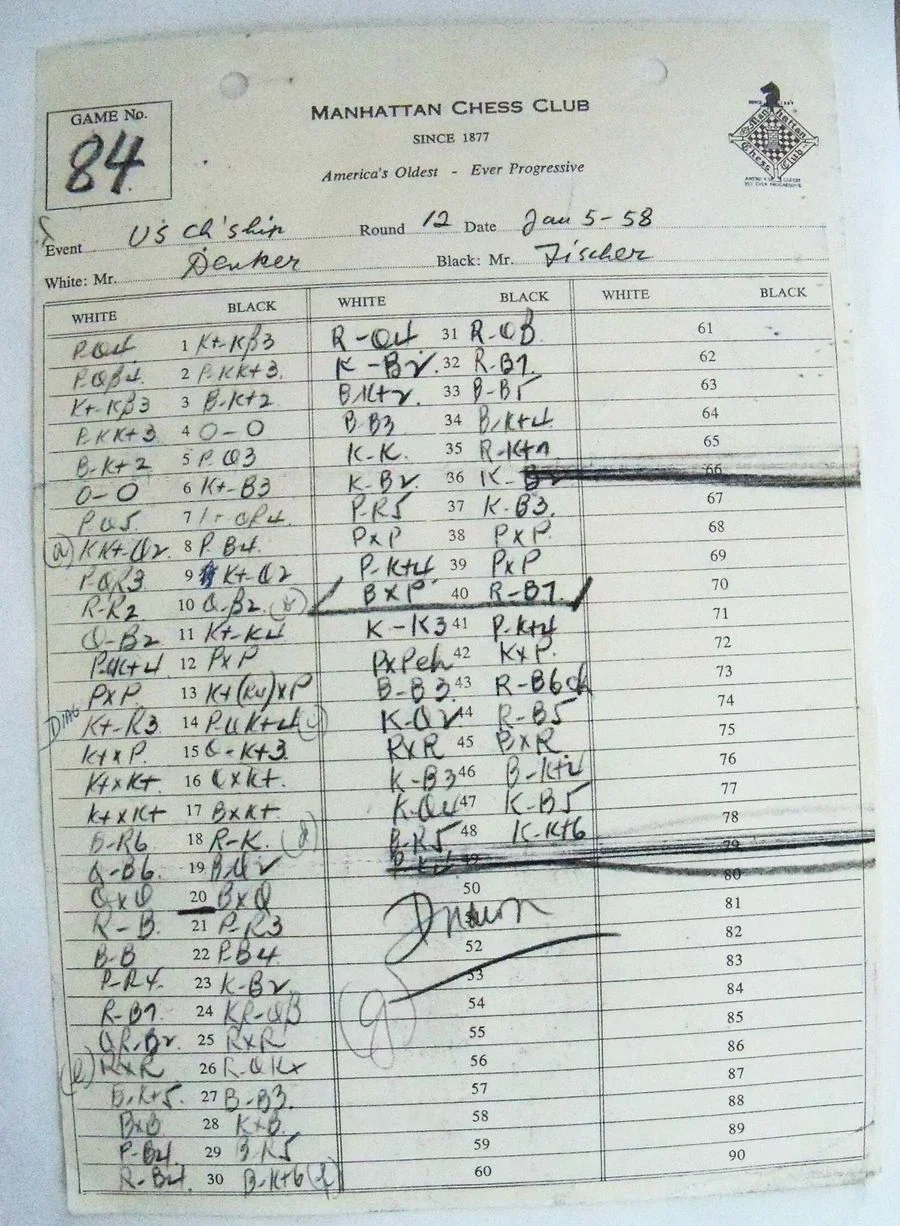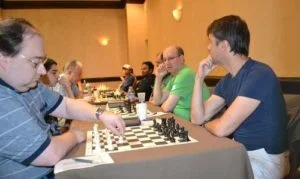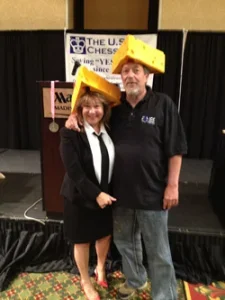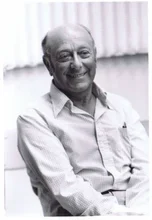
GM Arnold Denker (February 20, 1914 – January 2, 2005) was an American chess player, Grandmaster, and a chess writer, but he will forever be remembered for his passion for promoting chess for students. He was an important chess organizer, serving on the Board of Chess-in-the-Schools, the United States Chess Federation, the U.S. Chess Trust, and the driving force behind the prestigious GM Arnold Denker National Tournament of High School State Champions.
"The Denker", as it’s become known, is an annual event held in conjunction with the U.S. Open, in which the 51 high school champions of each state affiliate and the District of Columbia compete to determine who will be crowned the Denker Champion of Champions.
Denker Champions
Click here for an Excel database of the Denker Champions list.
Denker Alumni
Click here for an Excel database of all Denker participants.
GM Arnold Denker: The Legacy
by Dewain Barber
August 2010 with permission.
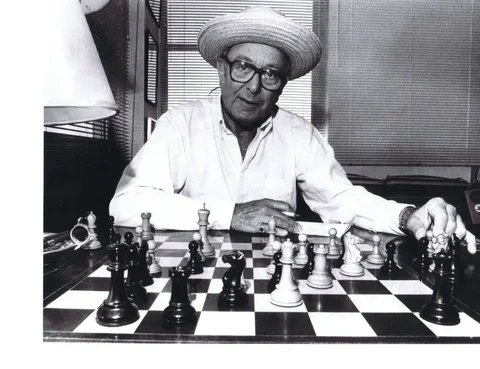
The Denker Tournament of High School Champions turned twenty-five years old this last August. I paused to reflect on how this event has evolved because at the start there wasn’t even a site picked. GM Denker simply said to me when he called one evening many years ago, “I want to do something for the kids.” At first, I thought he was simply going to donate his time to do a simultaneous exhibition or volunteer to pass out trophies at one of the Nationals. But as it turned out, it was a whole lot more than I expected.
First, it was the idea of selecting deserving players who would want to travel to an event. He then provided an idea or two suggesting an event that brought together every state high school champion. But, would it be the highest rated player who qualified? Would it be based on age or something else?
As it turned out the decision we agreed upon was to invite the champions from the high school tournaments of each state to play. But, when? Since I was acquainted with the scholastic schedule, I knew that many of the months that might be considered would be out. The fall was the start of school year, the winter would present problems with travel, and the spring was devoted to competing in state events and the Scholastic Nationals. The end result was a decision by both of us that the summer would work. But, where? There were few scholastic events available during the summer, and most families were on summer vacation. This would mean starting a new event with no support. Arnold suggested the US Open as a possible site. He had been US Champion and had played in the US Open for many years so it seemed a possibility. The US Open was a very prestigious event with many strong players at all levels and ages wanting to compete so the fundamental question was, “Would the US Chess Federation accept a bunch of high school kids playing at their event?” Maybe yes, maybe no.
I mentioned to GM Denker that there were several committees that needed to review this, and any one of them could say no. As it turned out there was moderate interest in the idea, but I sensed it would take more than moderate interest to get it passed by the USCF Delegates and accepted. I had truly forgotten that I was dealing with one of the most charismatic and dynamic persons to ever push a pawn. GM Denker stepped forward and made the case with many of his long time friends that this event would be good for the kids and good for chess. The case was made and the vote was unanimous to approve.
That was all good and fine, but what were the rules and who would decide when it came to the issue of qualifications. I mentioned to GM Denker that I would try to write some rules and he stated he would provide a stipend of $100 to each participant. The early years saw just over half of the states attending with many states not even bothering to return messages to the USCF Scholastic Director. I wondered if this event was ever going to get at least two-thirds of the states and maybe help support a young man who wanted to become a GM.
Several times I would contact a high school state champion and the word was, “The Denker event does not have any strong players and I have other things to do during the summer.” At this point, it was very much like the film about baseball: “If you build it they will come.” Sure enough they did, and the state count began to rise because GM Denker kept up the positive enthusiasm needed to move this event forward. He always had a smile and a kind word to say to the players with interesting stories and a sense of humor flowing through the conversation. The man was magnetic, had the joy of living, and funny chess stories that kept the gathering alive.
He gained support from the University of Texas at Dallas (UTD) who provided a scholarship. Texas Tech has also supported the event and so has the Chess Trust.
One time he said to me, a few years before his death that he was going to change the name of the event. I was surprised at the thought, but he said, “Let’s change it.”
I said, “No, absolutely not. You have created a legacy that will be continued and appreciated by all the chess players who see the event, follow the results, and cheer on their champions.” I knew he was just kidding, but I am happy for what has been accomplished and that Mitchell Denker, his son, came on board a short time ago when GM Denker passed away. Mitchell continued that same enthusiasm. It is with great pleasure and reverence that I say it has been an honor to meet and greet the young people who can proudly say, “I played in the Denker!” It is a legacy that the entire chess community can be proud of. As we move into the next quarter century, it will continue to shine as an example of the best we can offer from Alaska to Maine, Michigan to Texas, Florida to Hawaii and from California to Virginia. I say from the deepest part of my heart: “Thank you, Arnold, for the legacy you have bestowed upon the chess community.”
GM Arnold Denker, A Chronology by Bill Wall
1914 – Arnold Sheldon Denker was born on February 20, 1914 in the Bronx, New York.
1922 – Arnold Denker learned chess at the age of 8 by watching his older brothers play.
1928 – Denker began playing in chess tournaments as a high school freshman at Theodore Roosevelt High School.
1929 – At the age of 15, Denker won the New York City individual interscholastic championship.
Denker was a Golden Gloves boxing quarterfinalist and later a boxing manager. He won three successive Golden Gloves bouts by knockouts (welterweight division).
1930s – Denker graduated from New York University. While there he was a fullback on their football team.
1936 – Denker took 2nd place at the US Open in Philadelphia.
1936, December – Denker married Nina Simmons.
1937 – Denker got a job in a meatpacking company.
1938 and 1939 – Denker won the New York State championship.
1940 – in an exhibition in Cleveland, Denker played 100 opponents in 7.33 hours.
During World War II, he gave exhibitions at military bases and aboard aircraft carriers. He also was invited by the US government to help crack enemy codes.
1942 – Denker tied for 3rd place in the U.S. Chess Championship in New York.
1944, May – Denker won the 5th U.S. Chess Championship. He scored 15 1/2 – 1 1/2 (14 wins, 0 losses, and 3 draws). This is the best result (91%) in US Chess Championship play except for Fischer’s 100% record. Denker’s 14 wins are the most in any US Chess Championship.
1946 – From May 4 to 18, Denker played and won the U.S. Chess Championship again.
1947 – Denker wrote “If You Must Play Chess.”
1948 – Denker took over his meatpacking business when the previous owner died. He became the owner of a food-distributing firm in Jamaica.
1950 – Denker was awarded the International Master title. His USCF rating was 2575.
1953 – Denker was the 5th highest rated USCF player in the US, behind Reshevsky, the Byrne brothers, and George Kramer.
1970 – Denker retired to Fort Lauderdale, Florida.
1981 – Denker was made an honorary Grandmaster.
1981 – Denker wrote “My Best Games of Chess 1929-1976.”
1983 to 1991, Denker served as FIDE zonal (Zone 7) president and a member of the FIDE Qualifications Committee.
1984 – Denker started planning the Arnold Denker Tournament of High School Champions.
1992 – Denker was inducted into the U.S. Chess Hall of Fame.
1993 – On November 12, Arnold Denker’s wife, Nina, died at the age of 78.
1995 – Denker co-wrote with Larry Parr “The Bobby Fischer I Knew and other stories.”
2004 – Denker was given the title of “Dean of American Chess” (Hermann Helms and George Koltanowski were the first two title holders).
2005 – Denker died at his home in Fort Lauderdale, Florida on January 2. He had brain cancer. He was 90.
CLO Stories On Past Events
- 2024
https://new.uschess.org/news/what-expect-124th-annual-us-open
https://new.uschess.org/news/124th-annual-us-open-and-tournaments-state-champions-begin-norfolk
https://new.uschess.org/news/leaderboard-takes-shape-halfway-through-tournaments-champions-us-open
- 2023
https://new.uschess.org/news/what-expect-123rd-annual-us-open
https://new.uschess.org/news/us-open-and-invitational-tournaments-have-begun
https://new.uschess.org/news/us-open-day-two-big-day-grand-rapids
https://new.uschess.org/news/invitationals-enter-final-round-us-open
https://new.uschess.org/news/georgia-top-dawg-day-four-us-open
- 2022
https://new.uschess.org/news/party-starts-day-1-rancho-mirage
https://new.uschess.org/news/day-3-rancho-mirage-drama-builds-invitationals
https://new.uschess.org/news/day-4-rancho-mirage-invitationals-end-6-day-begins
- 2021
https://new.uschess.org/news/champions-champions-crowned-121st-us-open
- 2020
https://new.uschess.org/news/checa-wins-denker-while-wang-takes-haring
- 2019
https://new.uschess.org/news/invitational-winners-2019-orlando
https://www.denkerchess.com/wp-content/uploads/2019-Denker-Standings.pdf
- 2016
What the Denker Meant To Me
by GM Alexander Fishbein
From PSCF Annual, 2005 with permission.Image
In 1985, the US Chess Federation announced a new tournament. It was called the “U.S. Tournament of High School Champions.” It was a novel concept: each state sends its High School champion to compete for the national title. It is a tournament where all the participants are already winners.
I was a high school senior at the time. Living in Colorado (and before that, in Wyoming), I was known mostly in the Rocky Mountain West. In late 1984, I started studying with Grandmaster Dmitry Gurevich – my first coach after I came to the United States from Russia in 1979, and my chess improved quickly. By the summer of 1985, I was the best player in the region, but I was looking for some national recognition. The Tournament of High School Champions seemed like a perfect way to achieve it!
The first step was to qualify. There was one other competitive high school player in Colorado: an expert named Steve Towbin. Although I outrated him by about 300 points, I knew that in a Swiss system state junior championship tournament, with a fast time control, anything could happen. Following the tradition of Botvinnik, I lobbied to change the qualification rules so as to increase my chances! I had a seat on the board of the Colorado State Chess Association and this gave me additional power. I wanted to virtually guarantee that I got in! It seemed that chance should not decide who goes to this very important event, and I was able to make that case. I suggested a match between the top two players in the state (with a slow time control) to decide who qualifies, and I won the match against Steve, 4-0 (the state championship tournament had ended with us sharing first).
After qualifying, I was able to raise funds for my trip by giving simuls around the state. I remember that at the end of one of those simuls, one of the participants told me “When you go to that tournament, win it, and show them who is the boss!” I don’t think I had the confidence yet that I could do that – but by the time the event started I felt that I had a chance.
When the tournament started, it was called the “U.S. Tournament of High School Champions”, but by the end of the tournament it had been renamed the “Arnold Denker Tournament of High School Champions”, and now people just call it the “Denker”. It was the start of a great tradition – and a great tribute to Grandmaster Denker, who always saw youth chess in America as a top priority.
Looking at the crosstable now – I was the highest-rated participant at 2409. But I did not at all think I was the favorite. Before one of my games, my coach Dmitry Gurevich told me: “Don’t be afraid of your opponent because you are stronger than he is.” I am not sure I quite believed it.
Winning 5 games in a row after a first-round draw, I won clear first in the inaugural Denker tournament. I feel honored to be part of the history of this event.
Fishbein,Alexander (2409) – Lief,Adam (2382) [C02]
Denker (6), 08.11.1985
1.e4 e6 2.d4 d5 3.e5 (The Advanced was my favorite line against the French, and I still play it now from time to time.) 3…c5 4.c3 Nc6 5.Nf3 Bd7 6.dxc5 Qc7 (In this line, Black should develop the Knight and immediately fight for the center with 6…Bxc5 7.Bd3 Nge7 8.Bf4 Ng6 9.Bg3 f6) 7.Bf4 Bxc5 8.Bd3 Nge7 9.Qe2 f5 10.h4 0-0-0 (It was better to castle Kingside. On the queenside, the King will feel unsafe. Adam was a half-point behind and probably wanted a very sharp game, but my space advantage makes it easier for me to attack.) 11.b4 Bb6 12.0-0 h6 13.a4 (It was better to start with Na3, with a quicker development.) 13…g5! 14.hxg5 (14.Bh2 immediately was probably better) 14…Ng6 15.Bh2? (A mistake, giving Black a strong attacking chance which he missed. Correct was 15.Bg3) 15…a5? (With 15…hxg5 Black could have taken advantage of White’s loose bishop on h2 with an immediate attack. For example, 16.a5 Bxa5! 17.bxa5 g4 18.Ng5 Rxh2! 19.Kxh2 Nf4 20.Qe3 Nxd3 21.Qxd3 Nxe5 22.Qg3 Rh8+ 23.Kg1 f4 24.Qxf4 Nf3+) 16.Na3 (Now White is on the right track.) 16…Be8 17.b5 Nb8 18.c4 d4 19.c5! (A thematic clearing sacrifice, in the style of Nimzovich. The pawn gives itself up, allowing both the Knight and Rook to join the attack.) 19…Bxc5 20.Rfc1 b6 21.Nc4 Kb7 22.gxh6 Rxh6 23.Ng5 (An imprecise move order. 23.Nd6+ Ka7 24.Ng5) 23…Qe7 24.Nh3 Nh4 (Now Black’s queenside falls apart. He could try to hold his position together with 24…Nd7.) 25.Nd6+ Ka7 26.Rxc5! (An efficient concluding attack.) 26…Qg7 27.Bg3 bxc5 28.Qd2 Kb6 29.Nc4+ Kb7 30.Qxa5 Nf3+ 31.gxf3 Rxh3 32.Kg2 (Taking on d8 was also possible.) 32…Rxg3+ 33.fxg3 Qe7 34.Nd6+ Rxd6 35.exd6 Qxd6 36.b6 Nc6 37.Qa6+ Kb8 38.b7 Kc7 39.Rb1 Nb8 40.Qxd6+ Kxd6 41.a5 1-0
Footnote: Alexander went on to become a GM in 1992. The game that appears above was played in the last round and gave him the title of 1985 GM Arnold Denker Champion of Champions.
- 2015
Eternal Youth: Arnold Denker and the Promotion of High School Chess
by Neil Brennen
From PSCF Annual, 2015 with permission.The chess world was saddened with the recent death, on January 2, (Ed. note 2005), of Grandmaster Arnold Denker…I’d like to look at one specific aspect of Arnold Denker’s chess – his promotion of it at the high school level.
Denker’s chess career in fact began as a high school student. Richard Denker, in an obituary notice published on the USCF website, wrote of his father’s debut as a chess player, “He first attracted attention by winning the New York City individual interscholastic championship in 1929 at age 15; he considered those games some of his finest.” And in fact one of those games, a sparkling win against Howard Feit, was included in Denker’s game collection If You Must Play Chess, and his collection of reminisces co-written with Larry Parr, The Bobby Fischer I Knew and Other Stories. Curiously enough, the gamescore as published in those books and elsewhere gives a different move-order for the opening, and ends a move sooner. Either Hermann Helms altered the score prior to publication, or Denker “improved” the score for book publication, either deliberately, as Alekhine is known to have done on a number of occasions, or as a result of a faulty memory. Below is the gamescore as it was published in the Bethlehem Globe-Times, quoting Hermann Helms’ New York Sun column.
Arnold Denker – Howard Feit
New York Interscholastic Championship, 1929
Notes by Hermann Helms1.Nf3 b6 2.g3 Bb7 3.Bg2
Keeping step with the times. The youngsters are nothing if not modern.
3...e6 4.0–0 f5
Turning the opening into a Dutch defense with a fianchetto variation.
5.d4 Nf6
6.c4 Be7 7.Nc3 d6
(The version of the gamescore in Denker’s book and most databases begins 1 d4 f5 2 Nf3 “Being unfamiliar with this opening, I was unaware of the existence of the Staunton Gambit.”
2...e6 3 g3 b6? 4 Bg2 Bb7 5 O-O Nf6 6 c4 Be7 7 Nc3 d6 - If You Must Play Chess, page 3. - NB)
8.d5 e5 8...exd5 9.Nd4 and there are several weak spots in Black’s position.
9.Ng5 Bc8
Necessary before castling, in order to avoid the loss of the exchange.
10.e4 0–0 10...fxe411.Ncxe4 0–0, followed by ...h6, would have freed his game considerably.
11.f4 considerably. 11.f4
11...ex f4 If now 11...h6 12.fxe5 dxe5 13.exf5 hxg5 14.d6 c6 15.dxe7 Qxe7 and White for choice.
12.Bxf4 fxe4 13.Ncxe4 Nxe4 14.Bxe4
Now the fireworks begin. White fully realizes that with the Queenside of his opponent fully undeveloped the time is ripe for an attack. Forthwith he sacrifices a piece, which brings him rich returns.
14...Bxg5 If 14...h6 15.Ne6 Bxe6 16.dxe6 c6 17.Qh5 Rf6 18.Bg5
Rxf1+ 19.Rxf1 Bxg5 20.Qf7+ and mates in two moves.
15.Qh5 Rxf4 The only move to let the King out. 15...g6 would be useless on account of 16.Bxg6 hxg6 17.Qxg6+ followed by Bxg5, etc.
16.Qxh7+ Kf7
17.Bg6+ Kf6 18.Rxf4+ Bxf4 19.Qh4+ Bg5 20.
20.Qe4 With the King out in the open and unable to escape, White can afford to make a quiet move. As will be seen, there is nothing to be done against the terrible threat of Rf1+.
20...Be3+ 21.Kh1 Bh3
22.Rf1+
A final brilliancy which settles it. If 22...Bxf1 (If 22...Kg5 23.Rf5+ Kxg6 24.Rf8+ etc.) White checkmates in two moves by 23.Qf5+ Ke7 24.Qf7# 1–0
Bethlehem Globe-Times, January 7, 1930
After a performance like that, it’s understandable that the fifteen-year old Denker would continue to play chess. And in a sense he continued to play chess as a fifteen-year old even into adulthood, despite the years of chess understanding he had accumulated. As Denker wrote in the introduction to his book If You Must Play Chess, “I still like to attack. If this be treason, then make the most of it!”
This fondness for youthful chess play spilled over into a fondness for youthful chess players. Denker befriended a number of young players, including the teenaged Bobby Fischer, during his career. And eventually, after his retirement, his connection to chess youth reached a new level. As his son wrote, “Grandmaster Denker took special pride in first starting (1984) and then sponsoring the national championship of high school state champions, known affectionately as “The Denker”.
Each year college scholarships are awarded to the top participants.” As impressive as this achievement sounds, it wasn’t in 1984, but four decades before, that Arnold Denker first underwrote a chess tournament for high school students.
In the Spring of 1945, Denker was conducting a simul tour, and visited Pittsburgh’s Downtown Y Chess Club, as the Pittsburgh Chess Club was then known, on March 13. The then-US Champion was scheduled for a simultaneous exhibition, and forty-two players shelled out a dollar a board to play against him. Denker made an impressive score against the strong Pittsburgh contingent, with several of the better players taking boards. For instance, Reverend Julius Paal, who would win Pittsburgh’s Metropolitan Championship later that year, played and managed to draw his game. Denker’s only loss in the event was to two Pittsburgh High School students who consulted and played together on one board. Perhaps inspired by their youth, the US Champion played with abandon, only to find the boys were as aggressive as himself. As Denker may have said, the young people “made the most” of their attack.
Arnold Denker - Jack Yeager and Robert Swan
Simul, Pittsburgh, March 13, 1945
1.e4 e5 2.d4 Nf6 3.dxe5 Nxe4 4.Bc4 Bc5 5.Bxf7+ Kf8 6.Nh3 Qh4
7.Bg5 Bxf2+ 8.Kf1 Nxg5 9.Nxg5 b6 10.Nf3 Qe7 11.Bd5 Qc5
12.Bxa8 Ba6+ 13.Qd3 Bxd3+ 14.cxd3 Qc1+ 15.Kxf2 Qxh1
16.Ng1 Qxh2 17.Bf3 Qh4+ 18.Kf1 Qg5 19.Nd2 Qxd2
20.Be4 Ke7 21.Nf3 Rf8 22.Kg1 Qe3+ 23.Kf1 Nc6 24.Re1 Qd4
25.e6 d5 26.Bxh7 g5 27.Ke2 Qxb2+ 28.Kf1 g4 0–1
Pittsburgh Chess Club En Passant, April 1945
In addition to the loss, Denker was nicked for a number of draws. One of the draws scored against the Grandmaster was also by a young player, ten-year old Mickey Cherington. In this case, the young player was forced against his will to leave due to the lateness of the hour; the En Passant’s claim that the boy’s father’s loss in the simul had something to the decision to leave should be considered also.
Arnold Denker - Mickey Cherington
Simul, Pittsburgh, March 13, 1945
1.d4 d5 2.c4 e6 3.Nc3 Nf6 4.Bg5 Nbd7 5.e3 Be7 6.Nf3 0–0
7.Rc1 b6 8.cxd5 exd5 9.Bd3 c5 10.0–0 c4 11.Bf5 h6 12.Bxd7 Bxd7
13.Bxf6 Bxf6 14.Nxd5 Rc8 15.Nxf6+ Qxf6 16.Ne5 Qe7
17.Rxc4 Rxc4 18.Nxc4 Bb5 19.b3 Rc8 20.Qg4 Bd 21.Qg3 Be6
22.Rc1 b5 23.e4 bxc4 24.d5 cxb3 25.Rxc8+ Bxc8
26.Qxb3 Qxe4 27.h3 ½–½
Pittsburgh Chess Club En Passant, April 1945
The Pittsburgh Chess Club En Passant included three additional games, a draw and two wins for the single player, from the Denker simul in the April 1945 issue. These games are given below.
Arnold Denker - Richard Gibian
Simul, Pittsburgh, March 13, 1945
1.e4 e5 2.Nf3 Nc6 3.Bb5 Nf6 4.0–0 d6 5.d4 exd4 6.Bg5 Be7
7.Bxc6+ bxc6 8.Nxd4 Bd7 9.Re1 0–0 10.Nf5 Re8 11.Nxe7+ Qxe7
12.Qf3 Qe5 13.Bxf6 gxf6 14.Nc3 Kh8 15.Rad1 Rg8
16.Rd2 Rg4 17.Nd1 Re8 18.g3 Kg7 19.Rde2 Qc5 20.Qe3 Rg5
21.Qxc5 Rxc5 22.Kg2 h5 23.h4 Rce5 24.Nc3 Rb8 25.b3 a5
26.f3 Rbe8 27.Kf2 f5 28.f4 R5e7 29.e5 f6 30.exd6 Rxe2+
31.Rxe2 Rxe2+ 32.Kxe2 cxd6 33.Ke3 Kf7 34.Kd4 Ke7 35.Nd1 Be6
36.Ne3 c5+37.Kd3 Kd7 38.c4 Kc6 39.Kc3 Kb6 40.Nd5+ Bxd5
41.cxd5 Kb5 42.a4+ Kb6 43.Kd3 Kc7 44.Ke3 Kd7 45.Ke2 Kc7 ½–½
Pittsburgh Chess Club En Passant, April 1945
Arnold Denker – Lt. W. E. Hawkins
Simul, Pittsburgh, March 13, 1945
1.e4 e6 2.d4 d5 3.Nc3 Nf6 4.Bg5 Be7 5.e5 Nfd7 6.Bxe7 Qxe7
7.Qd2 a6 8.f4 c5 9.Nf3 cxd4 10.Nxd4 0–0 11.g3 Nc6 12.Bg2 Qc5
13.Nce2 Nxd4 14.Nxd4 Qc7 15.0–0 Nb6 16.c3 Nc4 17.Qe2 Bd7
18.f5 Rfe8 19.f6 g6 20.b3 Na3 21.Qd2 Kh8 22.Qh6 Rg8
23.Rf4 g5 24.Rf3 Qb6 25.Rf2 Rac8 26.Ne2 Nc2 27.Rc1 Ne3
28.Qh5 Be8 29.Qf3 g4 30.Qf4 Bb5 31.Nd4 Nxg2 32.Kxg2 Be8
33.h3 gxh3+ 34.Kxh3 Rg6 35.Rh2 Bd7 36.Kg2 Rcg8 37.Rxh7+ Kxh7
38.Rh1+ 1–0
Pittsburgh Chess Club En Passant, April 1945
Arnold Denker – H. P. Meese
Simul, Pittsburgh, March 13, 1945
1.e4 e5 2.Bc4 Bc5 3.b4 Bb6 4.Nf3 d6 5.a4 a6 6.Nc3 Nf6 7.h3 Nc6
8.b5 axb5 9.Bxb5 Bd7 10.0–0 0–0 11.d3 Nd4 12.Be3 Nxb5
13.axb5 Rxa1 14.Qxa1 Bxe3 15.fxe3 h6 16.Qa7 b6 17.Nh4 Qb8
18.Ra1 Be6 19.Qxb8 Rxb8 20.Ra7 Rc8 21.Na4 d5 22.exd5 Nxd5
23.e4 Nb4 24.Nf3 f6 25.Ne1 c6 26.Nxb6 Rb8 27.Ra8 Rxa8
28.Nxa8 cxb5 29.Nc7 Bd7 30.Kf2 Kf8 31.Ke3 Ke7 32.c3 Na2
33.Kd2 Kd6 34.Nd5 Be6 35.Kc2 b4 36.Nxb4 Nxb4+
37.cxb4 Kc6 38.Kc3 38...Kb5
At this point, Black resigned because of the lateness of the hour. But his position is lost, at any rate. 1–0
Pittsburgh Chess Club En Passant, April 1945
A few months after Denker’s appearance in Pittsburgh, the Downtown Y Chess Club helped organize a scholastic tournament for high school students in the greater Pittsburgh area. The original notices about the tournament in the club’s newsletter don’t mention the source of the funding. It was only revealed, almost as an aside, in the May 1947 issue of En Passant, by William Byland. As part of a short comment on fundraising for the club, Byland mentioned that “Denker during his visit a couple years ago”, had made a donation to the Downtown Y Club for the purpose of holding the high school tournament. Thanks to Denker’s generosity in suggesting and sponsoring the Pittsburgh tournament, scholastic players in the Three Rivers area gained in experience and deepened their love for the game of chess.
“Teaching chess and passing the game to the next generation was his great passion,” wrote Richard Denker of his father. Few people have spent as much time and money on promoting high school chess as Arnold Denker. Few have had as much impact as he. And fewer still have taken as much pleasure from helping scholastic chess. The body aged, the mind slowed, the eyes dimmed, but the heart remained young and was sympathetic to the young. And if this was treason, Arnold Denker made the most of it.
Each year the winner of our State Scholastic Championship is eligible to represent Pennsylvania in the Denker Tournament of High School Champions.
Many thanks to Tom Martinak for assistance with this article.
- 2014
The GM Denker I Knew
By Susan Polgar
Image
GM Denker was one of the kindest individuals that I have ever met. He was one of the few people who made his voice loudly known in support of the 2004 US Women’s Olympiad Training program that I started. When I discussed with him about following his and Dewain Barber’s idea to sponsor the Susan Polgar National Invitational for Girls, he was in full support. He said it was about time things are done to help the girls.
When I faced a lot of political road blocks just to even get the Polgar event off the ground with my own personal money, he once again made his voice loudly known in support of the USCF sanctioning this event the same way as the Denker event. He did not back down to anyone who attacked the idea of giving opportunities to girls.
He was honest, thoughtful and the best interests of the children were always his #1 priority. He was amazed to see so many girls showing up for the Susan Polgar National Invitational for Girls in the first year while doubters said that no more than 10 girls will show up. We more than triple that number and we were on equal pace with the Denker in only our second year.
GM Denker did complain to me and Mr. Dewain Barber two things about the Denker and Polgar event. He complained about the scheduling of the events at the same time as the US Open. The US Open usually begins too late in August and many kids had to miss the beginning of school or they could not to attend. The other thing he complained about was there was no discount or free entry for the Denker and Polgar players who want to play in the US Open as well.
On behalf of the Susan Polgar Foundation and all the Polgar players to date, I would like to thank GM Denker and his family for supporting these events, two that changed the lives of so many young chess players.
Without his kindness, vision and actions, many of the young players would not be able to attend college today. He will always have a special place in my heart and I am eternally grateful for him being my friend and mentor.
- 2013
GM Denker Medallion
Image
In the Olympics, each country is invited to participate and winners receive medallions. I created the Denker Medallion to honor all participants who represent their state in the GM Arnold Denker Tournament of High School Champions.
I remembered seeing a show that did an interview with one of our Olympic Gold Medal winners. As the interview proceeded, the commentator asked to see the medallion that had been presented to our national representative. As he held the medallion in his hand, the commentator said, “I did not realize how heavy this is.” I thought that if we presented medallions they should not be the thin, small award that is found in many scholastic events. We needed a medallion that had some size and weight to it.
I located a company that could make our Denker Medallion, but now the challenge was what design should I use? Would it be a king, rook, bishop, knight or pawn? Everyone knows the knight is the symbol of the game of chess so I started looking at different designs for the knight figure. Using the chess figurine charts I came across many knights that were highly decorative and some that were ultra-modern. This simple task had now become very complicated. So, how did I decide?
Putting aside the figurine charts for a few days I continued to fill orders for my company, American Chess Equipment. It was ACE that would pay for these medallions if I could just figure out which design I wanted and get on with it.
ACE had designed a chess set called the Ultimate set. In order to have the set produced, we needed a diagram for each of the pieces with exact measurements. I realized that the knight design was already in my possession and could be used on the medallion. Since that time, ACE has provided a Denker Medallion to every player who steps forward when his or her name and state are called.
Mitchell Denker (1947-2013)
By Dewain Barber
Image Image CaptionBarbara DeMaro and Mitchell - Denker, Madison, WI
Image CaptionBarbara DeMaro and Mitchell - Denker, Madison, WIIt has taken me a long time to come to terms with the loss of Mitchell. He and I worked together on the GM Arnold Denker Tournament of High School Champions since the passing of his father, Arnold. He was a genuine caring and concerned representative of his father’s legacy. Mitchell’s legacy represents the second generation of the Denker and I am proud to have known him.
During the years we worked together and with the support of the Chess Trust we saw the Denker event emerge as the “place to be” when it came to quality events available to high school players. The University of Texas at Dallas (UTD) made the event shine by providing a four year scholarship.
Finally, Mitchell truly made every player feel comfortable and was pleased to see them and was proud of every state representative from Maine to Hawaii and Alaska to Florida. He will be missed, but not forgotten. Below you will find several obituary articles about Mitchell Denker:
Published on Chess Life Online, August 28, 2013.
Mitchell Denker died on Saturday, August 24 2013 in Leland, North Carolina. Mitchell’s father was two-time US Champion and Grandmaster Arnold Denker (1914-2005). Mitchell honored his father’s memory with continual support for the Denker, which was founded in 1985.
His good friend, Barbara DeMaro of the US Chess Trust (where Mitchell served as a trustee) was pictured with Mitchell at the most recent edition of the Denker in Madison, Wisconsin. Barbara said: “Mitchell was full of life, brilliant, kind, witty and generous! Mitchell truly cared about each and every one of the Denker participants. At the opening ceremony every year, as he greeted each participant, took their flag, he would say something funny or interesting to them that made them smile or laugh. I have lost a very, very dear friend and will miss him more than you know.”When asked about his passion for the Denker tournament of high school champions, Mitchell said, “I shared my father’s enthusiasm for helping young players. When my father asked me to keep the tournament going after him, I agreed. My son, Dylan, has also agreed to keep it going after me.”
Published in the Wilmington Star-News on Aug. 27, 2013.
Mitchell Denker, 66, formerly of Key West, FL, passed away on Saturday, August 24, 2013, in Leland, NC. He was born in New York City and lived on Long Island until his college years. When his parents, Arnold and Nina, moved to Florida, he followed, and lived in Florida most of his life; he completed college, studied law and practiced in Key West. In 1994 he and his wife Jaye, and their sons Dylan and DJ, moved to Belleview, Florida, where they lived for over 13 years. Chess was one of Mitchell’s passions and he has been a Trustee of the U.S. Chess Trust for several years, honoring his father’s memory with sponsorship of the annual Denker Chess Tournament for High School students, which provides a scholarship to the University of Texas to the winner. During his time in Belleview he served as the President of the Haas Fund, a charity for children in need of financial support for the arts and athletics, a member of the Belleview Zoning Commission, Chairman of the Grievance Committee of the Florida Bar Association, and as President of Shepherds Lighthouse, a live-in facility for battered women. He was also a traveler, taking every chance to get to see the world, particularly the parts least traveled by tourists. Two years ago, Mitchell, Jaye and Dylan moved to Wilmington, North Carolina, where he served at the Cape Fear Volunteer Center for the Big Buddy Program. In addition to his parents, he is predeceased by his beloved daughter, Jana Denker. He is survived by his wife, Jaye Holt Denker; son, Dylan Denker; stepson, Douglas R. Jones, III, sister, Randie Denker; brother, Richard; niece, Gaea Denker-Lehrman, and his Little Buddy, Tyrese Diggs.
The Chess Program at the University of Texas at Dallas (UTD)
By Dr. Tim Redman
Chess restarted at UTD when two students sought two chess-playing professors, Esteban Egea and Tim Redman, to sponsor a chess club. With the advice and encouragement of then Undergraduate Dean Dennis Kratz, Redman met with Provost Hobson Wildenthal to plan a comprehensive Chess Program at the University of Texas at Dallas, which launched in 1996.
From the beginning, the Provost insisted that a university chess program must meet academic as well as competitive goals. A member of the Executive Board of the U.S. Chess Federation, asked that UTD consider offering on-line courses on chess and education for undergraduate and graduate credit. After securing a grant from the UT System Distance Learning Program, Redman and former U.S. Women’s Champion Dr. Alexey Root launched these courses, which Dr. Root still teaches.
With help from the Provost, Jim Eade, the U.S. Chess Trust, and the Texas Chess Association, Team UTD held the first (2001) and second (2011) Koltanowski International Conferences on Chess and Education. Select papers from the first conference were published as a book in 2006. A book of essays from the second conference is forthcoming.
Since its founding in 1996, the UTD Chess Program has offered millions of dollars in chess scholarships. All universities compete for talented students; UTD is one of the universities which seeks them among the ranks of chess players. Redman directed the Program from 1996 to 2006. He was followed as Director by Jim Stallings in 2006. Since its inception, the UTD Chess Team has won a number of national and international college chess championships. Aside from Stallings, its staff is made up of a full-time chess coach, IM Rade Milovanovic, and a half-time administrator, Luis Salinas.
Tim Redman enjoyed a decades-long friendship with GM Arnold Denker and his wife Nina. Arnie always said that if you play chess, you will find friends wherever you travel. The same is true for our students. Coming to UTD you will have a couple of dozen friends on your arrival. But winning the Denker may be the most difficult way to get a scholarship at the University of Texas at Dallas. If you have outstanding grades and test scores or are a national merit scholar, we will find a way to support your study at UTD.
Tim Redman was a member of the national champion college chess team at the University of Chicago, where he received his Ph.D. in Comparative Literature. He has served twice as President of the US Chess Federation and is Professor of Literary Studies in the School of Arts and Humanities at the University of Texas at Dallas.
In 1996, when the University of Texas at Dallas began offering scholarships to winners of selected scholastic events who also demonstrated strong academic potential, because of my longstanding friendship with Arnie and Nina, the Denker was at the top of my list. I liked what Arnie was doing for the high school state champions. If I had to guess, I would guess we started in 1997. But you would have to verify that date. I’m in Italy without access to my chess files.
When the world championship match between Karpov and Korchnoi was held in Merano and Bangkok, I wrote to American grandmasters who were friends and whom, I knew would be in Merano. Robert Byrne, Arnie, Yasser Seirawan. A dear friend of mine, Mary De Rachewiltz, lived in a castle, Schloss Brunnenburg, in Dorf Tirol, immediately above Merano. I suggested to all that they call and pay a visit. Only Arnie and Nina were smart enough to do so. They had a great time — tea with Mary and a tour of the castle. Nina was very knowledgeable about public art and got to see the newly sculpted gates of the castle.
Arnie had terminal cancer when Don Schultz went to visit him. We played two games of chess, Don and I, consulting, versus Arnie. Arnie, sharp to the last, split 1-1 against us. A photo of the second game was circulated on the internet. After he died, National Public Radio interviewed me about his chess career. Arnie and Nina were my dear friends and I loved them.
- 2012
Arnold Denker vs. R. Fischer
by Dewain Barber
From Chess Life, November 2008 with permission.I had the pleasure recently of visiting Mitchell Denker, the son of GM Arnold Denker. I wanted to see if there were more items of interest that he had maintained at his home in North Carolina. As we talked and reviewed the memorabilia of his father’s past, I came across a scoresheet dated January 5, 1958. Glancing at the top I noted the item was from the Manhattan Chess Club and I saw below: White: Mr. Denker Black: Mr. Fischer. It was hard to believe, but I believe I was holding the actual scoresheet used by Arnold in his game against Bobby Fischer that ended in a draw. Arnold played Bobby only two times with one win for Bobby and a draw in the other game. Although this game has been published many times, holding a piece of history is greatly appreciated by this retired history teacher. Below you will see what I saw.
Image
Remembering Arnold
by Harold J. Winston, US Chess Trust Chairman
When I first meet Arnold, it was probably at the 1975 USCF Directors meeting at Lincoln, Nebraska. The following year I ran for the USCF Policy Board (later renamed the Executive Board). And, as it turned out, Arnold was my opponent. Our close friendship began later. In August 1979, Arnold came to me and complained that two week US Opens were too long and too expensive for him and others. I co-sponsored a successful Delegate resolution to authorize a nine day US Open, which has since become the standard. Later Arnold supported me in my Policy Board campaigns in 1982 for Member-at-Large and in the 1987 run for USCF President.
I supported him becoming FIDE Zonal President, a position in which he worked hard to make sure USA players received the FIDE international titles they had earned. When I went to the 1989 FIDE meetings as USCF President, I observed Arnold’s fine work, together with our other representatives in FIDE, Don Schultz and Fan Adams and the support of Carol Jarecki from the Virgin Islands. Arnold was very helpful to me when I attended those FIDE meetings.
Arnold had a warm and friendly and outgoing personality and a zest for life that earned him many friends at home and abroad. My wife, Carol Weinberg, and I enjoyed talking with Arnold and his wife, Nina and visiting them in their Ft. Lauderdale, Florida apartment. Arnold could identify with problems others had; he had the endearing quality of empathy.
Arnold wanted to help other players and came up with the idea of a tournament of High School Champions, which was named for him. Years later when a dinner was held honoring Arnold (I believe on his 90th birthday), Arnold was thrilled to receive a plaque listing all the winners of the Denker Tournament of High School Champions that US Chess Trust Managing Director Barbara DeMaro and I presented to him. Arnold loved watching games in the Denker tournament.
Image
In 1988, the US Open and meetings were held at the Lafayette Hotel in Boston. One night a fire alarm went off. Players and delegates alike walked down the stairs, including Arnold’s wife, Nina. Not Arnold. He emerged from an elevator with his jaunty trademark white hat in place.
My two daughters, my wife, and I enjoyed breakfast meetings with Arnold when he was at the US Open. His book, The Bobby Fischer I Knew, co-authored with Larry Parr, is an enduring legacy of his generosity and recognition of other players’ accomplishments. He was a very special person and I miss him a lot.
- 2011
Chess and Music
Chess, more than any other game, challenges the player’s ability to think ahead. Nothing is left to chance; everything depends on careful planning, patience, and skill. What has this to do with music?
Well, there are certain analogies between chess and music. The idea is that chess players and composers think and work alike in many respects. The materials may be different, but both are engaging in the creative process, the chess player with his 16 pieces, and the (other) composer with his 12 notes. Chess players and composers manipulate their materials to build a structure that will be durable enough to stand the test of time.
The structure of the chess game is formalized like a composer’s Sonata form. In a Sonata, the composer starts out with an idea or “exposition”, puts that idea through its paces or “development” and brings back the original idea or “recapitulation”.
A full length chess game has many points in common with the Sonata. The chess player also starts out with an idea which is analogous to the so-called “first subject” of the Sonata form. He may open with the King’s pawn, Queen’s pawn, or even the Knight’s pawn. Whatever opening he selects, that opening has its own laws of development. The player with the black pieces is in a similar position. He defends according to certain well-known laws of development. There is a name for this phase of the game; it is called “the opening” just as the first phase of the Sonata is the “exposition”.
Just as exposition is followed by development, so in chess the opening is followed by the middlegame. As the composer of a sonata develops his original ideas, so the chess player develops his. In Sonata form a chess game’s development or middlegame is by far the most complex and hazardous part of the totality. It is there that the imagination and resources of the composer or chess player come into flower. It is there that the worth of the original ideas becomes apparent.
Then, comes the recapitulation in music and endgame in chess. Here the analogy becomes a little forced, for in music the original ideas come back whereas the endgame in chess is the distillation of the original idea. Pieces have been traded off. One player may have a slight edge and must rely on his technique to make use of that edge. What sets off the genius in great composers and great chess players from the average layman, is a special quality of imagination.
Young chess players study in much the same way as do music students. Both spend hours and hours on repertory, reading through works of the past, memorizing the great ones, and constantly studying technique and theory. No music student in history has spent more time on his art than the young Bobby Fischer spent on chess. Memory is important. Great chess players and great musicians have incredibly retentive memories — and it is a memory, incidentally, that does not carry outside of their fields. It is not only openings that have to be memorized. Just as musicians study books on harmony and counterpoint, so chess players study books on middlegame and endgame theory. The great artist, however, — the Beethoven’s and Wagner’s (in music) — the Fischer’s and Korchnoi’s (in chess) rely as much on intuition as on book learning. Geniuses of this caliber leave the rules far behind; they make their own. Players on that level are not content with routine; they do the unexpected because they have the gift to conceptualize the unexpected. They modulate and their modulations are of intense power and beauty. For in chess, as in any art, the aim is to create a logical and expressive structure and do it through the use of ideas that nobody else ever had.
Dr. T and Me
It was Xmas of 1946 and anyone who has ever been to Hastings & St. Leonard’s knows how the cold and damp air of that part of England can gnaw at your bones. At nights I tried playing in my beaver lined trench coat only to end up watching the curtains being propelled back and forth by a cruel wind that pushed clear through the glass. Under these conditions you can easily understand why tea-time was the most popular event of the day. Steaming hot tea with all kinds of breads and jams were served in a large room with a crackling fireplace. It was under these conditions that I had the good fortune to meet the late GM Savielly Tartakower.
After collecting his tea and crumpets, he was in the habit of placing his rear end in front of the fireplace usually letting out soft squeals of delight. On most occasions his fly would be open, and when informed of this irregularity he would put down his cup, say, “J’adoube” while turning to face the fireplace and then making the necessary adjustments. This happened so frequently that after a while no one bothered to pay attention.
During the Second World War Tartakower was supposed to have been Mr. X who worked for the Secret Service of the Free French. If so, he never mentioned any of his exploits. He had a way of telling stories with a sense of humor during which his puckish-like nose and rosy cheeks and eyes would shine with delight while waiting for your reaction.
One evening he told a story about a chess tournament just before the start of WW I where all the players were imprisoned. There was nothing to do so for diversion the men played chess created with pieces made out of bread. As the war went on rations became scarce and scarcer. Eventually they ate the pieces, and he claimed that was the origin of the expression, “I’ll make you eat the pieces.” As a chess player, he can best describe play by a true story. I played Dr. T in Hastings 1945/46.
My first and only tournament encounter with Dr. T was in Hastings. He was White. I played a Sicilian Defense. He playing the opening incorrectly and after about 15 moves, I was a pawn up with no problems. He offered a draw. Naturally, I refused cockily thinking, “If this old man plays the rest of this game just as he played the opening, he won’t be around very long. Oh, how mistaken I was. We reached an ending with two Rooks and pawns on each side. I played quickly and confidently. Soon I was in a terrible bind. I would have liked to offer a draw, but I was ashamed. Every move he made was another nail in my coffin. I was totally humiliated. It was one of the best endgame lessons I ever got, but more than that it taught me respect.
Arnold Denker: The Beginning
Have you ever noticed how certain events which profoundly affect one’s entire life, often glide by completely unnoticed at the time? They seem to bury themselves in the subconscious waiting patiently for just the right moment to pop out and assert themselves. It happened to me so I know whereof I speak.
I was the youngest in a family of five (4 boys and 1 girl). My parents were Orthodox Jews, and as custom had it in those days, the boys all entered Hebrew School at five years of age. During services we all sat alongside our father who listened closely to see that we slurred not a single word. He was a perfectionist who fervently believed that religion was the foundation for the so called “good life.” For all his pains we referred to him as the “little general” when his back was turned. Hardly the kind of background to nurture a future U.S. Chess Champion. What’s more chess, as well as all games, were frowned upon by both parents. Their common complaint was, “from such ‘narrischkeit’ you’ll never win a scholarship to the Yeshiva.” Of course, studying chess was totally forbidden, but that didn’t stop me from sneaking down to the basement to study in the middle of the night when everyone was asleep.
How had I gotten myself into such an awful predicament? It all started the summer of 1923 when my eldest brother, Peter, returned from Heidelberg where he had been studying medicine on a scholarship. While there he acquired a taste for two things: chess and beer, and it wasn’t long before be passed on both to his closest brother, Sid. Occasionally when they played I was allowed to watch. That is how I learned the moves that summer, and that is when a turning point in my life slipped unobtrusively by.
In the fall when my brother left to begin his internship at Bellevue Hospital, chess left with him. Years passed without even a mention of the game. Suddenly in my freshman year in high school it all came back to life. I was having lunch in the school cafeteria when a group of boys entered and began setting up the pieces on the table alongside me. There were six of them, and after watching for a while I innocently asked if I might play. I was told they played for nickels, and if that was alright with me they had no objections. That nickel was my milk money, and for the longest time I did without any milk.
Then one day I discovered Lasker’s Common Sense in Chess in the school library. My visits to the basement began in earnest, and I soon knew the book by heart. From then on my nickels came pouring back with interest. Still later when I discovered, Chess Fundamentals by Capablanca, there was no holding me. I now played Board One on the Theodore Roosevelt High School Team, and our team walked off with the Interscholastic Championship of the City of New York. In addition, I won the Individual Championship for the highest score on Board One right up until graduation.
After graduation I won the Intercollegiate Championship while playing for NYU, and then the New York State Championship twice in a row. Still later, I won the US Championship and successfully defended it over three years. Unfortunately, it was not possible in those days to earn a decent living playing chess, though I tried every way possible. Nevertheless, I would not change a thing if I were to live it all over again. Chess has enriched my life in so many ways that I will ever be grateful.
Through my work as the Zonal President of the World Chess Federation, I have friends all over the globe. Chessplayers young and old share a common bond that removes all age barriers instantly. It is this common interest that binds them together. Youngsters too enjoy the challenge of chess, and that is one of the reasons it is such a fine educational tool. Just as remarkable is how the game ruthlessly points out the error of one’s ways. It forces you to concentrate, and punishes illogical thinking in a way one will not soon forget. Many objective studies have point this out, and my own experience with twelve Harlem students that I took to the Soviet Union on a match tour, convinced me that it can be of great help to underprivileged children. Maybe it’s because in chess they see true justice and equality for the first time in their lives. Whatever the reason, I have never seen such a transformation in twelve would-be hoodlums. By the end of our tour they made me feel proud and fulfilled.
In 1985 after working with teenagers for many years I thought it might be a good idea to hold a tournament consisting of the fifty State High School Champions. With the help of the United States Chess Federation I soon raised enough money to pay the players expenses and supply scholarships to the top prize winners. The tournament was an immediate success and has now become a permanent fixture in American Chess. Last year I had the pleasure and the honor of seeing it renamed the “Denker Tournament of High School Champions”.
Today is my eightieth year in chess and it still keeps on paying dividends. Whenever there is a dull moment I vanish into my chess room for an hour or so, always to return refreshed and invigorated. There is always something new and interesting in chess. Just losing oneself in fields of Elysian delights for only a few moments can prove as salutary as any religious experience. For all this and much more, I am truly grateful. I would like to show my gratitude for that fleeting moment that set all this in motion. Would it be enough to pass on some of what I’ve learned to the next generation?
The "Pied Piper" of US Chess
by Don Schultz
“Hello, Don. This is Arnold!” I heard those words so often that they still ring in my ears. His passing was not just a loss for chess but a loss for his many friends inside and outside the world of chess.
Arnold was always happy. He saw the good in everyone. He truly was the pied piper of chess constantly followed by friends and fans throughout his life—the number in the line behind him getting longer and longer.
But Arnold was not Arnold, he was Andrew. Let me explain. At birth he was given the name Andrew. This appears on all official documents, his birth certificate, driver’s license, passport, etc. When still a young boy, for reasons unknown, an uncle always called him Arnold. He was too nice to contradict his uncle and the substitute name stuck. It spread to the point that few people outside his immediate family ever knew his real name was Andrew.
One time, Arnold and I were at a Chess Olympiad in Greece. A little Romanian boy approached us. He said, “Hello! I am a chess player. Would you like to see some on my games?” We said sure and were amazed at the quality of the games and the boy’s ability to remember the moves and relevant variations. We invited his father and him to come to Florida and play a match with Arnold. The details were worked out and the match was played. The spectators at the match fell in love with the charm of the young boy. As much as we loved Arnold, we rooted for the youngster—clearly a star of the future. Amazingly, Arnold also rooted for the young boy. But Arnold true to his chess ethics could never deliberately lose a chess game—so Arnold won the match. We later helped the young boy and his family move from Romania to Florida. The boy, Gabriel Schwartzman, went to the University of Florida in Gainesville, graduated first in his class with all A’s, finished the 4 year curriculum in 2 and ½ years and during that time won the US Open and became the youngest GM of the period. After college, he left chess and is now CEO of a medium size company developing computer products.
Arnold was not without faults. He was the most impatient man I ever knew. It cost him. As a result he became the first grandmaster to ever lose a game to a computer. The game was even and truly a dead draw. Move after move, Arnold offered the computer a draw which was again and again declined. The computer simply did not recognize that the position was dead even. Finally out of frustration, Arnold changed the course of the game and entered a highly complicated position. Shortly after that, Arnold was forced to resign and received the questionable distinction of being the first grandmaster to lose to a computer.
Arnold’s second love, after chess, was horse racing. We would go to the racetrack every Saturday that there was no chess. He was not a big bettor. He would come back to our seats after making a bet and say in a loud voice: “I just bet two big ones on the long shot, number five.” Heads would turn and those sitting nearby thought it was $200 or $2000. Two big ones to Arnold was actually $2.00! Often he would say to me things like: “Don, I was up all night studying the racing form. Number 6 is a sure winner. Believe me none of the other horses have a chance against him. Bet big time on him”. I did and when I returned I said to him, “How much did you bet on number six”? Arnold replied: “Nothing. I bet on number two. At the last moment, I noticed how good number 2 was”. When we returned from the track, Teresa would always ask Arnold, “Well, how did it go today?” The answer was generally, “I almost won; just missed again and again. Arnold "almost" won several small fortunes betting on the horses.
During the Olympiads, the players got together and studied different positions. Often an almost 90 year old Arnold would make a suggestion. I took notice of the respect the great Grandmasters Seirawan, Chistiansen, deFirmian and Benjamin gave to his suggestions which they had not previously considered.
While planning a birthday party for Arnold, our mutual friend Data Tan Chin Nam (Malaysia) asked me what Arnold would like for his birthday party in Florida. I asked Arnold and he said that he wished a couple of his good FIDE friends could attend. I asked him to name three and he said: “Timman, Averbach and Campomanes.” Dato liked Arnold and sent me a check for $6,000 to pay their expenses.
My article would not be complete without including one anecdote including Arnold’s wife, Nina. Arnold and Nina were driving to a chess tournament when he was stopped by the police for speeding. After several admonishments, the police officer announced he was writing out an official warning ticket and the next time he would not be let off so easily. Nina immediately demanded that the officer give her his name and badge number, and she stated that she would make an official complaint. “About what?” asked the officer. Nina replied, “This man was going too fast and you are simply giving him a warning!” The officer was stunned and Arnold inquired as to whether he was going to get a ticket. The officer replied, “No, you have enough problems already.”
Arnold’s greatest love was the Denker Tournament of High School Champions. It was the one chess item for which he included in his will. Unfortunately due to complications that money got misdirected at the last moment. Realizing how important that bequest had meant to his father, Mitchell Denker made up for the loss.
I want to thank Dewain Barber for giving me this opportunity to relate a few stories regarding my good friend, GM Arnold Denker.
The GM Denker Legacy Continues: Interview with Mitchell Denker by Ralph E. Bowman
Who are the members of your family?
My father was Grandmaster Arnold Denker (1914-2005). He won the US Chess Championship in 1944 and 1946. In 1985 he started the Grandmaster Arnold Denker Tournament of High School Champions.
My mother Nina Denker (Born 1915- Died 1993) was a woman who spoke her mind. She was always puttering around with something artistic.
I am the middle child. I played tournament chess until I was 10 or 11 and I stopped when I became more interested in baseball (my father once had a tryout with the New York Yankees). Richard is 6 years older so he may very well have been involved in tournament chess just not after I had cognizance. My sister Randi (named after one of my mothers favorite poets) was the youngest.
My parents brought home an orphan from Spain in the early 60s named Maria-Teresa. She lived with us about 5 yrs. Randi and I always thought of Maria-Teresa, who was about 4 years older than me, as a sister. Maria-Teresa did play chess and Richard and Randi and I stay in touch and visit her in Spain, where she is married with children.
Growing up, was the fact that your father was a famous chess person a hindrance or benefit?
Neither really. It was a benefit among chess people and since chess was not as popular as baseball, not that many people knew of his accomplishments outside of the chess world, so it was not a hindrance.
What well-known chess persons have you met through your father?
Very many. Many in foreign countries either when I was with dad or not. My sister actually dated a couple of grandmasters the only one I can remember was GM Miguel Quinteros from Argentina. I would say a majority or more of the American GMs from the 30s to the 1994 US Championship, which dad and I had brought to Key West in honor of my mother. As to names when I was a little kid Horowitz, GM Arthur Dake (during my dad’s last 15 years they wrote and talked a lot), GM Sammy Reshevsky (my father had more losses than wins against him). I remember dad telling me that in the big 1946 tournament in Russia that Reshevsky would go a couple of days without eating because he was Jewish and could not find Kosher food), IM James Sherwin (President of the American Chess Federation) and probably everyone that belonged to the Manhattan Chess Club. I was there a lot from age 10 to 18. Dad would bring me to the city, I would go do my thing (ballgame etc.) and then meet him for a ride home.
Others like GM Jan Timman and IM Hans Bohm stayed with me while visiting the US. Bohm actually stayed for months. A majority of these meetings were brief, a lunch with GM Alexey Shirov, and a dinner with GM Victor Korchnoi. I got to know GM Gabe Schwartzman pretty well as he lived 30 miles from me in Florida. I remember that my dad had a tournament record of 13-1 against GM Arthur Bisguier. GM Reuben Fine was a close friend of my dad’s, even though my dad always beat him in tournaments. GM Boris Spassky was a good friend of my dad’s and often stayed at our house, especially just before he became World Champion.
My father had an uncanny ability to forecast future world champions. He predicted that Bobby Fischer, Anatoly Karpov and Garry Kasparov would be world champion’s years before they actually became world champions.
What was your first memory of Bobby Fischer?
I was there in 1957 when Bobby Fischer won his first US Championship at the Henry Hudson Hotel in New York City. What I thought was unusual is that all of the other competitors were wearing suits and Bobby was wearing a t-shirt with horizontal strips, basketball shoes and jeans with the pants legs rolled up. I immediately liked him because he was a rebel.
Bobby Fischer won the 63-64 US Championship with an 11-0 record. The record Bobby broke in going undefeated was that of my father. My dad had previously won the US Championship with a record of 14-0-3, which was the best won-loss record to that date.
Years later, after I became a lawyer, my father asked that I handle some legal work for Bobby Fischer.
Did your family ever sit down for games of chess?
Once, about a year before he died, my brother, sister and I played him a simul. He never looked at any of the boards; instead he was doing crossword puzzles and Sudoku. He beat all three of us.
Late in his life, did he do anything to really impress you?
The day before he died he played a simul against USCF past president, Don Schultz and another man and won both games.
Do you remember an unusual story about your dad in your younger years?
My father took the family to a Dairy Queen one day. We waited for some time for service. Dad was annoyed at no one was coming forward from the back so he started tapping a coin on the metal counter very loudly. Still no one came forward, so he went outside, around back, entered the back door and found the owner and another person playing chess with the other employees watching. He bet the owner $300 against the store that he could beat him three straight games. The man accepted the bet and my father promptly beat him three straight games. Being the gentleman he was, my father did not ask for the store, but we did get our ice cream.
Why did your dad start the Denker Tournament?
He wanted to help get young chess players into the national spotlight.
Why are you continuing to support the Denker Tournament?
I shared my father’s enthusiasm for helping young players. When my father asked me to keep the tournament going after him, I agreed. My son, Dylan, has also agreed to keep it going after me.
- 2010
California, Here Comes the UCSF
by Steven Zierk
From Chess Life Online, October 2010 with permission.The Denker tournament, named in honor of GM Arnold Denker, has become one of the most prestigious events on the annual scholastic calendar under the dedicated stewardship of Dewain Barber.
This was my second try at the Denker. The first try was two years ago, and didn’t go very well; the first round saw me lose playing down 450 points, and the last round was a 130 move loss in a complicated Exchange down endgame. This year was a bit more successful. Although all of my games were tough, long games against strong opponents and several times being outplayed in the opening, I managed to take the edge and pull off wins in the long run. This last round game was no exception. It was a Caro-Kann, yet it quickly became a fierce fighting game with attacks storming on opposite wings. A tactical oversight by Kevin gives me the upper hand, and despite ingenious attempts his position never recovers. Despite missing the simplest and most obvious win, I cleanly converted the advantage in another last round Exchange down endgame. (The protected passed pawn on the seventh helped a bit.)
The tournament was superbly organized—it is the first in my memory where every round started on time. Everything went very smoothly from beginning to end. The only thing I could suggest improving is the time control—in almost all of my games, both of us were under 10 minutes for a large portion of the game. Of course this may not be practical due to limited time, but I just wish I had a bit more for each game.
Caro-Kann Defense, Modern Line (B17)
FM Steven Zierk (2425)
Kevin Zhang (2203)
Denker (6), 08.03.20101. e4 c6 2. d4 d5 3. Nc3 dxe4 4. Nxe4 Nd7 5. Nf3 Ngf6 6. Ng3 e6 7. Bf4
An unusual move, trying to stop … Bd6. I didn’t remember the theory, since I’d never played this line in a game before. The main move is 7. Bd3.7. … Be7 8. Bc4 0-0 9. Qe2 Nb6 10. Bb3
Black has difficulties developing, so for now White has a solid advantage.10. … Nbd5 11. Bg5?!
Both White and Black miss the shot 11. … Bb4+! forcing awkward concessions from White. 12. c3? Nxc3 is losing, and 12. Bd2? leads to the nice tactical shot 12. … Nf4! 13. Qf1 Bxd2+ and it is hard to decide whether 14. Kxd2 or 14. Nxd2 is less appealing. White has to play 12. Nd2, but after 12. … h6 Black’s position is at least fine. White had to accept 11. Bd2.11. … Qc7?! 12. 0-0-0
I didn’t particularly want to play this, but White has to do something about the threats of … Bb4+ and … Nf4 followed by … h7-h6. From here on out the game is extremely complicated.12. … b5 13. c3 a5 14. Bc2 a4 15. Qd3 Nf4 16. Bxf4 Qxf4+
Both sides want to attack on opposite wings.17. Kb1 b4?!
He should have prevented White’s next move, perhaps by 17. … g6 or 17. … Qh6 immediately.18. Nh5! Qh6 19. Nxf6+ gxf6
After 19. … Bxf6 20. cxb4 followed by 21. a3, it is hard for Black to break through White’s pawns, while g2-g4 and h2-h4 to open up Black’s king are easy for White.20. cxb4
I preferred this to allowing … bxc3, but it doesn’t look right. One should very rarely move pawns on their weaker side. Perhaps 20. c3-c4, allowing 20. … b4-b3, is best.20. … Bxb4 21. g4 Ba6?! 22. Qe4
Now White has two threats: 23. g5 fxg5 24. Nxg5 and the one in the game, which my opponent missed.22. … Qg7 23. d5!
The position is still very dangerous, but now White wrecks Black’s pawns.23. … Rab8 24. dxe6 Ba3 25. b3
25. e7!?!? Rxb2+ 26. Ka1 is worth serious consideration, and my longest think of the game was deciding between these two moves. Ultimately I went against 25. e7, since even if it is good, my opponent is allowed massive threats and I could not actually find a solidly better line. It is much safer to play 25. b3.25. … f5 26. Qe5
Black’s position is very difficult—his attack has stalled and thanks to the d5 trick, White is smashing through in the center. Kevin finds some ingenuous moves, but it is not enough.26. … Be2!?
Before you look ahead, a little puzzle for you: see if you can find White’s next move.27. Rdg1!
Now Black’s king and queen are the ones in danger. There is no defense short of an endgame down several pawns.27. … Bb2 28. Qxb2?
I considered the more materialistic but dangerous 28. Qxe2, and 28. Qxg7+ and 28. gxf5. However, my mind completely shut out the obvious 28. Kxb2!, winning instantly. Perhaps I had just considered the black queen to be protecting the bishop, but this is a simple mistake. In the end I decided I could comfortably win the upcoming endgame and there was no reason to risk 28. Qxe2. Kxb2 did not even enter consideration.28. … Qxb2+ 29. Kxb2 Bxf3 30. gxf5+ Kh8 31. e7 Rfe8 32. f6 Bxh1?!
A little note—the rook can’t run, why not wait for White to waste a move on the g1-rook first?33. Rxh1
Material is technically even, but a protected passer on the seventh and a weak king for your opponent are enough to win almost any game.33. … c5 34. Kc3 Rg8 35. Rd1
Black’s king is literally caged, and the rooks are confined to the first rank as otherwise White plays Rd8, trading a set of rooks and limiting his counterplay to even less.35. … Rbc8 36. bxa4 c4 37. Rd4 Rc6
White could now play Rd8 and the trade mentioned earlier, but he has a nicer move in mind.38. Rh4! Re8 39. Rxh7+ Kg8 40. Rg7+, Black resigned.
41. Rxf7, threatening 42. Rh7+ and 43. f7 mate, is too much.First Moves: US Open Extras
From Chess Life Online, October 2010 with permission.Current U.S. champion Hikaru Nakamura, in town to accept the USCF’s grandmaster of the year award, was in a light-hearted mood. He even chose to take a seat at one of the boards at the Denker Tournament of High School Champions simul, facing a perhaps perplexed Denker champion Steven Zierk who was conducting the simul.
The Denker Tournament of High School Champions is no Mickey Mouse operation, but Denker committee chair Dewain Barber donned the mouse ears in honor of being in Disneyland’s Orange County, while accepting his USCF Meritorious Service Award. See video of this, including Barber’s own version of the Mickey Mouse club song: https://www.youtube.com/watch?v=V6hCryu38Oc
- 2009 and earlier
Ursula Foster Memorial (Obituary)
First printed in August 17, 2006 with permission.
Image In Loving Memory of Ursula Lowenbach Foster
In Loving Memory of Ursula Lowenbach Foster(Crossville, TN) Ursula Lowenbach Foster, Holocaust survivor and former classmate of the now famous Anne Frank (author of ‘Diary of Anne Frank’), died in Modesto, CA, in August of 2004. She was 77 years old.
In 1938, at 11 years old, Mrs. Foster fled Germany with her family to Amsterdam to escape Nazi persecution. Two years later, Germany conquered the Netherlands, and brought the same persecution to the Foster’s new home. The last time she saw her older brother, Ernst, was July 14, 1942, when at age 18 he was arrested by the Nazis, and sent to Auschwitz Concentration Camp in Poland, where he died in the gas chambers.
Mrs. Foster is mentioned by name in the book written by Anne Frank. Her time of hiding was fraught with danger, fear, and deprivation. It was during this time that her father taught her how to play chess. On her 16th birthday, she was confronted by two Nazi officers, and narrowly escaped imprisonment when one of the men realized she looked remarkably like his own daughter, and chose instead to walk away. Throughout her life, she kept the yellow star, inscribed with “Jood” (Jew) that she’d been forced to wear as a child.
Though a shy woman, she lent her time and experience to school children at Modesto area schools, giving talks about the Holocaust and its horrific impact on her life and those of her family and friends. She was a civic volunteer, working with the Memorial Medical Center, driving cancer patients to and from medical appointments, and promoting literacy by delivering books to shut-ins and reading to underprivileged children.
Her sons are establishing the scholarship to continue their mother’s work and sense of civic duty, and keep alive her love of the game and devotion to young people.
(Editor’s note) Mrs. Foster’s sons, Rick and Cliff Lester, provide a scholarship of $500 awarded through the Chess Trust to the Top Player, age 16 and under, from the Denker Tournament of High School Champions. The Ursula Foster Award was created in memory of their mother’s life and dedication to young chess players.
Arnold Denker, 90, Dean of American Chess and Former US Chess Champion, Dies in Fort Lauderdale
First printed in January 2nd, 2005 with permission of the US Chess Federation
Arnold Sheldon Denker, the “Dean of American Chess” and United States chess champion from 1944 to 1946, died on Jan. 2, 2005 at his home after a brief struggle with brain cancer. He was 90 years old.
Grandmaster (GM) Denker, whose playing career spanned nearly three quarters of a century from 1929 to 2002, was renowned not only for tournament successes but also for a tempestuous attacking style filled with risky sacrifices and slashing assaults on the opponent’s king. Al Horowitz, a former New York Times chess columnist, wrote of GM Denker’s play, “The attack is both his strength and his weakness. He can handle an attack with a fertility of ideas and a richness of imagination that are rare. Yet frequently he tries to attack where defense is necessary or where the position does not warrant aggressive tactics.” To which GM Denker responded with his famed feistiness, “I still like to attack. If this be treason, then make the most of it!”
He first attracted attention by winning the New York City individual interscholastic championship in 1929 at age 15; he considered those games some of his finest. In 1940 he won the first of six championships of the Manhattan Chess Club, which was then regarded as the strongest aggregation of chess players in the world. Denker set a world record by playing 100 opponents in 7.33 hours, beating Capablanca’s record by one hour. During WW II, Denker gave simultaneous exhibitions at military bases and even aboard aircraft carriers. He was also invited by the US government to help crack enemy codes because of his chess prowess.
In 1944 GM Denker won the U. S. Championship with the score of 15 – 1 , a result of 91%, that is surpassed in U.S. title history only by Bobby Fischer’s clean slate of 11-0 in the 1963-64 championship tournament. In 1946 GM Denker successfully defended his title in a 10-game match against International Master Herman Steiner, scoring 6-4.
Business commitments prevented GM Denker from participating often in international tournaments, and he never mounted a challenge for the world championship. However, his tie for 10th – 12th at Groningen 1946, the first great tournament following WW II, placed him in the elite two dozen of world chess. In tournament and exhibition play, he drew with at least five world champions, including Bobby Fischer.
Grandmaster Arnold Denker represented the United Sates in numerous international competitions. He was a mentor of the World Chess Champion, Bobby Fischer. He served as President of the North American Zone of the World Chess Federation Internationale des Echecs (FIDE). Denker was on the Board of the American Chess Foundation, the United States Chess Federation and the US Chess Trust. In 1992, GM Denker was inducted into the U.S. Chess Hall of Fame. Denker received virtually every honorary award the chess world had to offer. He was designated a charter lifetime honorary member of the Board of Directors of the Florida Chess Association. In 1999, he was only one of two Americans whose names were entered into the World Chess Federation’s Gold Book at their 75th Anniversary celebrations in Paris, France. At a special awards banquet held in Boca Raton, Florida on June 11, 2004, Denker received America’s highest chess honor when he became only the third person to ever be proclaimed ” Dean of American Chess” of the United States Chess Federation.
After retiring to Florida, Denker gave unstintingly of his time to teach chess to young children. He helped create programs to bring chess into the school curriculum. The children who played chess were found to perform better in all academic areas. Teaching chess and passing the game to the next generation was his great passion. Grandmaster Denker took special pride in first starting (1984) and then sponsoring the national championship of high school state champions, known affectionately as “The Denker”. Each year college scholarships are awarded to the top participants. Among his many other accomplishments are his books, If You Must Play Chess and The Bobby Fischer I Knew and Other Stories.
Born February 21, 1914 in New York City, GM Denker graduated from New York University. He married the former Nina Simmons in 1936 and was married for 57 years until her death in 1993. Survivors include his daughter, Randie, of Tallahassee, Florida; and two sons Mitchell of Belleview, Florida, and Richard of New York City, as well as his grandchildren Jana, Gaea and Dylan.
The above note was provided by Richard Denker.
Donation information and tribute from Harold Winston, Chairman, U.S. Chess Trust
Grandmaster Arnold Denker, who did so much for chess, was a longtime Trustee on the U.S. Chess Trust and served as our President at one time. Tax-deductible donations to the Chess Trust can be made in Arnold’s memory, either for general charitable pruposes, or for the Denker Tournament of High School Champions, which Arnold created and supported. Arnold was a warm and caring person and full of ideas about popularizing chess. I was very greateful to kow him and all of the Trustees miss him.
Those of you who would like to share your tributes to Arnie can email them to Joan DuBois, Media Director at USCF and Chess Life Editor Daniel Lucas: Click here to show email address and Click here to show email address
Tribute from Larry Parr, former editor of Chess Life:
Gentlemen and Gentleladies,...Harold Winston puts his finger on the two things that made Arnold, Arnold. Vibrance and empathy.
Some people appear at times to be barely alive; Arnold usually was barely able to contain himself. He loved everything he was doing, right down to crossing a street by running through traffic with a saint’s faith that he would make it to the other side. Most of us think it is one of life’s little chores to get across a wide street with flowing traffic. He turned it into an adventure.
Arnold’s empathy was of an unusual type. Most people who have the quality of empathy demonstrate it at an immediate moment. Arnold’s was a reflective empathy. He often gave thought before helping a person, perhaps to find the best way, and he spent decades thinking about the great men of chess he once knew before putting his thoughts on paper.
One subject that came up often, when he and I had hot pastrami sandwiches at the old Applebaum’s just down from Macy’s, was the condemnation of Alekhine at a tournament in England following the war. On one occasion tears came to his eyes when thinking about the feeling of abandonment that Alekhine must have experienced. It was a subject that he never dropped from his mind, mentioned to me in a serious way at least a dozen times, though the events were a half century old.
Arnold felt he had done something wrong, and he could not help feeling what Alekhine might have felt.
Vibrance and empathy. Harold Winston hit it just right.
Yours, Larry ParrTribute from Daren Dillinger
I first met Denker at a chess tournament in Jacksonville 30 years ago. Since the tournament was not far from my home, He took me up on my invitation to come over and we did our first interview. Our picture ran in a 1974 issue of Florida Chess News.
Over the years I have talked with many bright lights of chess. I have liked them all (so far!), but sometimes a master’s ego will show through as being a self-promotion of themselves. Which is quite all right, for a healthy ego is good for a master to have. Denker, however, seemed more focused on promoting chess — not only at the master level, but as his life legacy has shown, he touched so many at every level. From the top of U.S. and International chess, to the common guys playing in regional events. As I had the pleasure of serving on the Florida Chess Association.. Board of Directors with Denker, I saw his tireless work up close.'
Before I was aware of Denker’s health issues, I started doing a rewrite of the Denker piece which ran in Florida Chess and also the Chess Journalist magazines. The attached update and rewrite attached is a good bit more text and has the addition of Denker’s favorite game when he was only 15 years old. Denker may have passed on, but his legacy is ongoing. Warmest regards, in the fellowship of chess.
From Gilberto Luna II, Programs Director with World Chess Hall of Fame
Arnold Denker made more of an impact on the Chess world as person, than he did as a chess player. He was a great person. Always polite, never hesitated stop and take time to talk to you. Every person was important to him. Every person was somebody. I remember the first time hearing his name. I was 14 playing my second open tournament; my father told me Arnold Denker is over there . He was 80 and moved like he was 30. I was at his 90th birthday party and thought he would live another 90. His energy rubbed off on you. He was only old by numerical standards. Always walking tall, and speaking with a strong voice. We were walking down the hall at this year’s US Open and he told me I m getting old Gil . If he hadn t of said it no one could of accused him of it. May his memory live on; the chess world will surely miss him.
For First Time, a Chess Computer Outwits Grandmaster in Tournament
By Arthur Bisguier Arthur Bisguier, an international grandmaster is a former United States champion and has won or shared the US Open title five times and has been active with youth chess.
October 19, 1988 with permission.Image
A new milestone in computer chess was achieved in late September when HiTech, the chess-playing computer from Carnegie-Mellon University in Pittsburgh, decisively triumphed, 3.5/4, in its four-game match against grandmaster Arnold Denker. Denker, a former United States champion (1944-46) who was famous for his swashbuckling style and sacrificial attacks, is only semi-active nowadays and was unable to cope with the remorseless and diabolical accuracy of the chess program of the mainframe computer of the Carnegie-Mellon team, headed by Dr. Hans Berliner, a computer scientist and himself a former world champion correspondence chess player.
After drawing the first game, Hitech went on to win the final three contests. According to Berliner, the computer scans 200,000 positions a second, which often enables it to analyze and assess certain variations that mere mortals discard out of hand as violating certain general rules that humans tend to treat as gospel.
An excellent case in point is the wonderful queen check from the edge of the board which HiTech came up with on the ninth move of today’s featured game (the fourth and final in the match).
Experts are generally loath to develop the queen, lest it will present a target and will be the subject of an attack that will often cost much time. In this game, though, there is a neat contrast between Denker’s early queen moves, which lost time while he isolated the White queen’s pawn, and HiTech’s queen check, which was the beginning of a remarkable attacking plan, perfectly calculated by the computer HiTech and obviously underestimated by the former US Champion.
The match, which was contested at the New School in New York City, offered a purse of $7,000. The prize money went into a trust fund established by Carnegie-Mellon.
Sicilian Defense Hitech Denker 1. e4 c5 2. c3 d5 (a) 3. exd5 Qxd5 4. d4 Nf6 5. Nf3 cxd4 6. cxd4 g6 7. Nc3 Qd8 8. Bc4 (b) Bg7 9. Qa4+ (c) Nbd7 10. Bxf7+ (d) Kxf7 11. Ng5+ Ke8 (e) 12. Ne6 Qb6 13. Qc4 (f) Nf8 14. Nxg7+ Kd8 15. O-O Bd7 16. Re1 Qd6 17. Bg5 Rc8 18. Qf7 Rc6 (g) 19. Nb5 Qb4 20. d5 (h) Qxb5 21. dxc6 Qxg5 22. cxd7 Nf6xd7 23. Rac1 (i) Resigns
A. The sharpest continuation. Often seen here is 2….Nf6, but the most discreet continuation is probably 2….e6, preparing for …d5 (i.e., 3.d4, d5, and now if White plays 4.exd5, Black has the option of recapturing with the pawn, while if 4.e5, we have an Advanced Variation of the French Defense).
B. White zeroes in on f7 before Black castles.
C. Black now has no less than five interpositions, none of which is satisfactory. For example, I:9….Nc6; 10.d5; II:9…. Qd7 is refuted by either 10.Bxf7+, Kxf7; 11.Ne5+, winning the queen, or 10.Bb5, Nc6; 11.Ne5. III:9….Bd7; 10.Qb3, O-O; 11.Ne5. Now if Black defends f7, White plays 12….Qxb7; and IV:9….Nfd7; 10.Bxf7+ is even stronger than V, the text continuation. Black had to try 9….Kf8, when his prospects remain very bleak, as he is several tempi behind in an open position and has forfeited the castling privilege.
D. A stock combination frequently seen in positions of this ilk, but this one has a novel twist.
E. Black loses his queen after 11….Kf8; 12.Ne6+ and his king succumbs after 11….Kg8; 12.Qb3+ or 12.Qc4+, followed by mate on f7.
F. This move is a stinger, which Denker appears to have overlooked in his calculations. He probably anticipated only the 13.Nxg7+, Kf7; 14.Bh6, Ng4 line, which is probably good for Black, since White’s advance pieces are somewhat shaky.
G. This seems necessary to guard against White’s threat of 19.Rxe7, Qxe7; 20.Bxf6.
H. White prepares to pry open Black’s king defenses. If the Black rook moves to a6 or b6, 21.d6 bisects and dissects Black’s position.
I. The HiTech computer always selects the shortest and most accurate finish possible. Now Black cannot stop 24.Qe8 mate without bringing on catastrophic loss of material.
Source: https://www.csmonitor.com/1988/1019/lchs19.html
GM Denker vs HiTech Computer
By Harold C. Schonburg
First printed in September 26, 1988. Article is posted with permission.The chess-playing computer HiTech was designed from 1986 to 1988 by student Carl Ebeling (r) under Professor and Senior Master Hans Berliner (l) at Carnegie Mellon University. HiTech’s custom hardware could analyze 200,000 moves per second and was the first computer to be rated over 2400.
Image Image CaptionHans Berliner and Carl Ebeling at Carnegie-Mellon University (Photo 1985)
Image CaptionHans Berliner and Carl Ebeling at Carnegie-Mellon University (Photo 1985)HiTech, the chess-playing computer from Carnegie-Mellon University, triumphed easily in its four-game match against Grandmaster Arnold Denker yesterday, winning the last game in 23 moves.
The victory marked the first time a chess program had beaten a grandmaster.”This is a machine with a sharp game,” Mr. Denker said. ”It plays the openings beautifully. Unfortunately I played badly.”
Most experts agreed that Mr. Denker, noted for his imaginative combination play and sacrificial attacks, was badly off form. It also was pointed out that he is 74 years old and does not play very much chess these days.
The final score for the match was 3 1/2 for HiTech to 1/2 for Mr. Denker, who admitted that the victory was an impressive achievement for a computer program. Mr. Denker had worked out a draw with HiTech Thursday night but had been unable to capture a point in the three succeeding games. HiTech previously had achieved victories over international masters, a lower ranking than that held by Mr. Denker, who was the United States champion from 1944 to 1946.
The game was an exciting one in which HiTech, playing the White pieces, sacrificed a Bishop on the 10th move. Later, in a post-mortem analysis, Mr. Denker said he had considered the sacrifice but had thought it was unsound for White; he had believed he could survive with an advantage. ”I was wrong,” he said. ”I overlooked White’s 13th move. When the machine played it, I knew I was dead. I played on, hoping for a miracle.”
There was none. HiTech remorselessly pressed on, ending with a murderous attack that forced Mr. Denker’s resignation in 23 moves.
A purse of $7,000 was involved in the game, which was played at the New School on West 12th Street. HiTech’s moves were relayed from a mainframe computer at Carnegie-Mellon in Pittsburgh to a portable terminal next to the game board.
Dr. Hans Berliner, a computer scientist and head of the team that created HiTech – the strongest chess computer ever devised – was part of the group of analysts who kept a running commentary on the game. The others were Grandmaster Edmar Mednis and the television chess personality Shelby Lyman.
”I was very pleased with the way HiTech played, and I’m very hard to please,” Mr. Berliner said. ”Hitech played this last game on a grandmaster level.” Grandmaster Mednis agreed that HiTech would give any player in the world a real struggle, although there was no doubt among the experts that HiTech was not yet on a strong grandmaster level.
”I think I could take it,” Mr. Mednis said. ”The difficult thing, though, about playing a machine is that it does not experience psychological pressure, whereas human beings do. It can play anywhere, under any conditions. Nothing bothers it.”
Dr. Berliner at one time was one of America’s strongest chess players. He came in high in various tournaments, and he also was the World’s Correspondence Chess Champion. He and his associates at Carnegie-Mellon are working on an improved model of HiTech that, he says, is about three years in the offing. The present machine can scan 200,000 positions a second. Mr. Berliner refused to say what HiTech’s offspring would be able to do.
”Anyway,” he said, ”speed alone is not the most important thing. HiTech scans in a dumb sort of way. It has to go through every possible position. A smarter machine might operate only on 100,000 scans a second, but it will confine those scans to positions germane to the situation. That is what we call a smart scan.”
He said the purse of $7,000 won by HiTech would go into a trust fund established by Carnegie-Mellon. ”Otherwise,” he said, ”the I.R.S. will be asking questions.”He Went From Losing Nickels To The Big Time
by Paul Jenkins
From the Sentinel Star, September 4, 1978 with permission.They used to take Arnold Denker’s nickels.
But that was years ago in a New York high school cafeteria during quietly vicious chess games. Nowadays, opponents would be wise to keep their money in their pockets.
Arnold Denker is “big time.”
The dapper international master, a former U.S. and state chess champion, is the premier attraction at the Florida chess championships at Florida Technological University. Final matches are today at 9 a.m. and 3 p.m.
Denker’s the man to beat, observers say, and he’s the man many of the 138 contestants came to see.
“If I knew just a tenth of what he knows, I’d be better than good,” said one youthful player Sunday. Asked if he would play Denker if the chance arose, he replied, “Nah, that’d scare me to death.”
Between matches, Denker, never far from his seemingly omnipresent straw hat, holds court outside the dead quiet Village Center auditorium, going over moves with awed younger players, discussing strategy, talking chess.
“I’m really fond of most of these kids. They’re so damned bright… they pick up everything. And don’t let anybody tell you differently, youth is the most important factor in chess. These long matches are a tremendous strain…,” Denker said.
Denker’s age “is a very sensitive subject with me. I’m going to be 65 soon.” He retired from his New York brokerage business two years ago, but his passion for chess is still strong.
“I think chess is the greatest mental discipline in the world… better even than mathematics. It should be taught in the schools. It mirrors life… a little mistake and you pay for it.”
During his chess career Denker has played the greats, including Bobby Fischer, the former world chess champion, who beat him once and played him to draw in a second game.
“Fischer will never play anymore… he’s a kook… it’s a shame because he won the championship and did nothing with it,” Denker said.
When Denker was 12 he started watching older boys play chess.
“I learned from watching. I’ve never had any formal training, but I did a lot of studying. I did some kibitzing and they finally told me that if I knew so much why didn’t I play them.”
“We played for nickels and I lost all my nickels… that was my milk money. So, I decided to get some books and study. Six months later I was on the high school chess team.”
He smiles, remembering those early matches.
“I got my nickels back from the guys.”
Denker GM Hall of Fame
Click here for an Excel database of the Denker GM Hall of Fame.
Ursula Foster Award Winners
Click here for an Excel database of all Ursula Foster Award Winners from the Denker.
Review – Humor in Chess
The authors are donating the profits from this book to the four scholastic invitationals (Denker, Barber, Haring, Rockefeller) so we gladly offer this review by Rachel Schechter here.
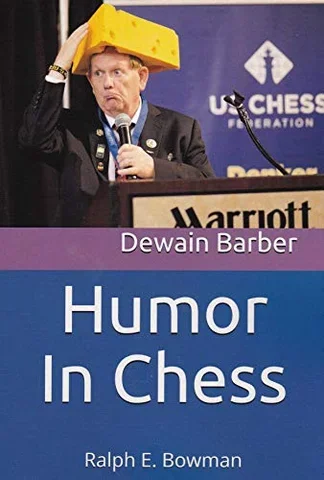
Beat the Covid-19 Blues with Humor in Chess, written by Dewain Barber, coauthored by Ralph Bowman. This warm, witty collection of chess jokes, quips, riddles, and anecdotes wins guaranteed grins and heartfelt chuckles. Drawing from 50+ years of experience, The Dean of Scholastic Chess has compiled a first-class compendium of wry one-liners, droll cartoons, and tongue-in-cheek chess tales that entertain and instruct—with a modest homespun wisdom sure to appeal to all manner of stripes (squares?) in our vast chess community.
Humor in Chess’ seven chapters offer something for everyone: Scholastic Coaches’ Stories, Player Stories, Chess Peace Cartoons by super talent Tony Sullivan, Tournament Director Stories, Tournament Organizer Stories, Denker and Barber Tournaments and Chess Vendor Stories. Over and again, innocence meets experience, striking an unique quirky balance. My personal faves include:
Chess Pasta, Chess Changes Lives, Never Give Up, True Story, Super Powers, Proper Words, Sunil Who?, Hand Made Chess Boards and Don’t Lose Your Head.
The international array of chess players, personalities, and circumstances we encounter in Humor In Chess is impressive—as is the homage Mr. Barber pays to Bernard Morrison and Arnold Denker among others, reminding us in Even GMs Start Somewhere Else that “it’s not where you are, it’s where you are going.”
Equally impressive are the Humor in Chess contributors, among them: Mike Atkins, Arnold Denker, Jim Eade, Alex Fishbein, Maureen Grimaud, Tim Just, Mike Klein, Shelby Lehrman, Mike Lennox, Chris Merli, Elliot Neff, Frank Niro, Garrett Scott, Ryan Velez, Suni Weeramantry and of course, the Duchess, Susan Barber.
Reviewed by Rachel A Schechter, Chess Instructor
US Chess 2019 Delegate
Downstate VP Illinois Chess Association
Education Consultant, Chess in Schools.us
Treasure Chess Affiliate, Owner


